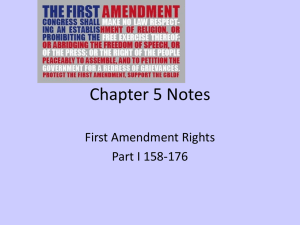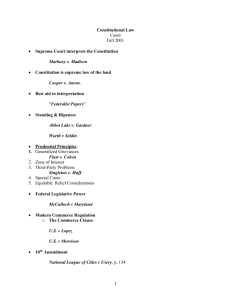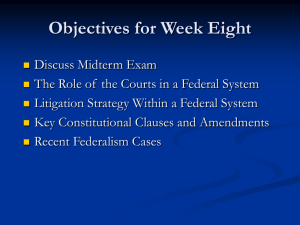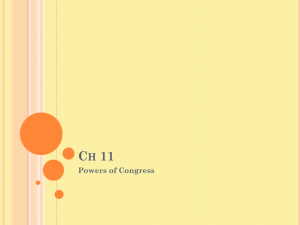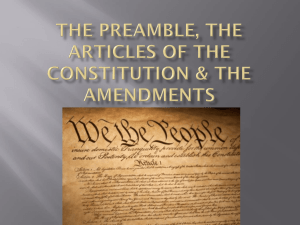File - Mr Wieburg's Classes
advertisement
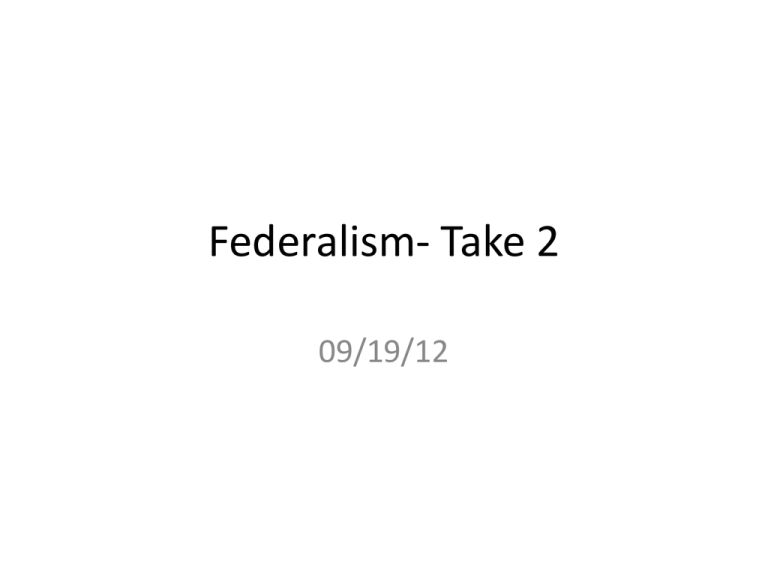
Federalism- Take 2 09/19/12 Evidence of Unitary or Federal? Mixed response to toddler plans Toddlers are encouraged to be healthy, competent learners A proposed "national curriculum" for babies and toddlers in England has received a mixed response. Under the Childcare Bill, childminders would teach the curriculum to children "from birth" - with some worrying that it might be too prescriptive. http://news.bbc.co.uk/2/hi/uk_news/education/4420138.stm Let’s look at the struggle b/w states and the feds— starting with the feds—it can be the boss by using sticks or carrots Mandates or "sticks" The supremacy clause means they trump—so they can tell the states what to do—that’s the “preemption doctrine”: if state and fed law conflict, fed law preempts state law Of course it must be acting in its “sphere” of enumerated powers found where? And even more expansively, within its implied powers made possible the what clause? EXAMPLE: Most environmental legislation (States are told: Clean up the air . . period). Clean Air Act Example: Civil Rights Legislation Remember: if the feds are mandating something, they must be acting within their “sphere” Separate but equal drinking fountains are bad . . . But that is not the question here—the question is can Congress do anything about it? Is it within their “enumerated powers sphere? They say yes it is within our authority to regulate _________and pass the Civil rights act And the “umpire” upholds it: In Heart of Atlanta Motel v. United States (1964), the Court ruled that Congress could regulate a business that served mostly interstate travelers; in Katzenbach v. McClung (1964) the Court ruled that the government could regulate Ollie's Barbecue, which served mostly local clientele but sold food that had previously moved across state lines; and in Daniel v. Paul (1969), the Court ruled that the government could regulate a recreational facility because three out of the four items sold at its snack bar were purchased from outside the state. Another Example: Americans with Disabilities Act Americans with Disabilities Act—States (and businesses) may not discriminate in employment and state and local governments must provide equal access to service, employment , buildings and transportation— Important note: Mandates can be funded . . . Or they can be partially funded . . . Or they can be unfunded . . . But they are a stick—the states must do it. The ADA was unfunded. No Child Left Behind was partially funded It’s a mandate And Utah refuses to comply with any parts that are unfunded Fiscal Federalism Fiscal Federalism is the power of the national government to influence state policies through grants Then there is the carrot approach . . . Carrots or strings attached to grants as "condition of aid" These proliferated in 1970's tells state govs. what they must do if they want money can apply just to a program---like if want highway money it must have a highway beautification plan, or what that has to do with drinking? or can cover all grants--if state builds anything with federal money, it must conduct an EIS. ("crosscutting) CNN July, 1996: Louisiana's legislature was the last to raise the minimum drinking age to 21 in order to save $14 million to $18 million per year in federal highway funds. In March, the state's highest court ruled that the minimum age hike was unconstitutional. A federal law enacted in December 2004 designates September 17 as "Constitution Day and Citizenship Day," to commemorate the signing of the United States Constitution on September 17, 1787. The federal law is included in Section 111 of Pub. L. 108-447 (Consolidated Appropriations Act of 2005). It contains the following provision in Section 111(b): "Each educational institution that receives Federal funds for a fiscal year shall hold an educational program on the United States Constitution on September 17 of such year for the students served by the educational institution." The U.S. Department of Education has published additional information about the new law at www.ed.gov/legislation/FedRegister/other/2005-2/052405b.html. If September 17 falls on a non-school day, educational institutions may hold the educational program during the preceding or following week. Let’s see how this plays out in the real world of today .. . . Shall we? http://www.nytimes.com/2010/09/15/health/policy/15hea lth.html Health Care Law Could Mean End of Federalism If It Is Upheld, Virginia AG Warns http://www.cnsnews.com/news/article/75212 Federal Judge Blocks Key Portions of Arizona Illegal Immigration Law http://www.foxnews.com/politics/2010/07/28/federaljudge-rules-arizona-immigration-law-dispute/ Key parts of Arizona anti-immigration law blocked http://www.reuters.com/article/idUSTRE66R45C20100728?rpc=21 Federal Judge Dismisses Officer's Challenge to Arizona Immigration Law: this illustrates http://www.foxnews.com/politics/2010/09/01/federal-judge-dismisses-officerschallenge-arizona-immigration-law/ Another way Congress can tell the states what to do: 14th Amendment, Section 5: 14th amendment section 1 says “No State shall deprive any person of life, liberty, or property, without due process of law; nor deny to any person within its jurisdiction the equal protection of the laws” Section 5 goes on to state “The Congress shall have power to enforce, by appropriate legislation, the provisions of this article” On that basis, the Court upheld a provision of the Voting Rights Act that prevented states from using English language literacy tests as qualifications for voting. The Court decided that the law was a valid exercise of Congress's enforcement power under the Fourteenth Amendment, because it was aimed at remedying state-sponsored discrimination But the discrimination by the states must be well documented. . . Facts of the Case In 1994, while enrolled at Virginia Polytechnic Institute (Virginia Tech), Christy Brzonkala alleged that Antonio Morrison and James Crawford, both students and varsity football players at Virginia Tech, raped her. In 1995, Brzonkala filed a complaint against Morrison and Crawford under Virginia Tech's Sexual Assault Policy. After a hearing, Morrison was found guilty of sexual assault and sentenced to immediate suspension for two semesters. Crawford was not punished. .. . Ultimately, Brzonkala dropped out of the university. Brzonkala then sued Morrison, Crawford, and Virginia Tech in Federal District Court, alleging that Morrison's and Crawford's attack violated 42 USC section 13981, part of the Violence Against Women Act of 1994 (VAWA), which provides a federal civil remedy for the victims of gender-motivated violence. Morrison and Crawford moved to dismiss Brzonkala's suit on the ground that section 13981's civil remedy was unconstitutional. In dismissing the complaint, the District Court found that that Congress lacked authority to enact section 13981 under either the Commerce Clause or the Fourteenth Amendment, which Congress had explicitly identified as the sources of federal authority for it. Ultimately, the Court of Appeals affirmed. • Question • Does Congress have the authority to enact the Violence Against Women Act of 1994 under either the Commerce Clause or Fourteenth Amendment? • Conclusion • No. In a 5-4 opinion delivered by Chief Justice William H. Rehnquist, the Court held that Congress lacked the authority to enact a statute under the Commerce Clause or the Fourteenth Amendment since the statute did not regulate an activity that substantially affected interstate commerce nor did it redress harm caused by the state. Chief Justice Rehnquist wrote for the Court that [i]f the allegations here are true, no civilized system of justice could fail to provide [Brzonkala] a remedy for the conduct of...Morrison. But under our federal system that remedy must be provided by the Commonwealth of Virginia, and not by the United States." Dissenting, Justice Stephen G. Breyer argued that the majority opinion "illustrates the difficulty of finding a workable judicial Commerce Clause touchstone." Additionally, Justice David H. Souter, dissenting, noted that VAWA contained a "mountain of data assembled by Congress...showing the effects of violence against women on interstate commerce." OK so the Trump Cards for the feds are . The Preemption Doctrine which derives from the Supremacy Clause: and says: federal law trumps conflicting state law But only if Congress is legitimately exercising . . . . An enumerated Power . . With the commerce clause being especially useful to them: Or an implied powers created through the “Elastic” or “necessary and proper” clause Or if there is a clear pattern of discrimination so they say they can use section 5 of the 14th amendment Any other time . . . States trump Because of general principles of federalism Because of the 10th amendment: The powers not delegated to the United States by the Constitution, nor prohibited by it to the States, are reserved for the States respectively, or to the people And because of the 11th amendment which recognizes the states sovereign immunity so the feds can’t allow individual damage suits against state officials 11TH AMENDMENT: PROTECTS STATES • After Patricia Garrett, Director of Nursing for the University of Alabama, was diagnosed with breast cancer, her treatment forced her to take a substantial leave from work. Upon her return, her supervisor informed her she would have to give up her position. She claimed the ADA protected her, and sued the state. In Univ. of Alabama v. Garrett (2001) 5 to 4 decision: Ct. held that Congress did not have the constitutional authority to open state government to lawsuits by their employees for violation of the Americans with Disabilities Act (protected by the 11th amendment) How about this case? Facts of the Case George Lane and Beverly Jones were disabled and could not access upper floors in Tennessee state courthouses. Lane, Jones, and several others sued Tennessee in federal district court, alleging that by denying them public services based on their disabilities, Tennessee was in violation of Title II of the Americans with Disabilities Act (1990). According to Title II, no person may be denied access to "services, programs, or activities" on the basis of his disability. The act allows alleged victims of discrimination to sue states for damages. Tennessee asked that the case be dismissed, claiming that it was barred by the 11th Amendment's prohibition of suits against states in federal courts (the sovereign immunity doctrine). The state cited Alabama v. Garrett (2001), in which the U.S. Supreme Court ruled that Congress had acted unconstitutionally in granting citizens the right to sue states for disability discrimination (such as the denial of employment) under the 14th Amendment's equal protection clause. In that case the Supreme Court reasoned that Congress did not have enough evidence of disability discrimination by states to justify the waiver of sovereign immunity. Question Did the Americans with Disabilities Act violate the sovereign immunity doctrine of the 11th Amendment when, based on Congress's 14th Amendment enforcement powers of the Due Process clause, it allowed individuals to sue states for denying them services based on their disabilities? 1 HOLDING: Ruling narrowly, the court held that states could be sued under the Americans With Disabilities Act for failing to make their courthouses accessible. The law requires accessibility for a broad array of public services and programs, but Justice Stevens's opinion for a 5-to-4 majority confined itself to the plight of wheelchair users in Tennessee who were barred by architectural barriers from entering county courthouses. Whether states can claim immunity from suit in other applications of the disability law remains to be seen in future cases Limited as it was, this decision was significant as a break from past decisions rejecting Congressional efforts to overcome the states' constitutional immunity from suit. The majority said Congress was justified in this context by a well-documented history of the exclusion from state judicial proceedings of people with disabilities. Chief Justice Rehnquist dissented, along with Justices Scalia, Thomas and Kennedy. So these were all cases involving conflict between state and federal law But remember the supremacy clause made 2 other things “supreme” . . . What were they? So now we will look at more disputes over whether state sovereignty can be taken away by . . . . Other provisions in The FEDERAL Constitution Oregon v. Mitchell (1970) Does Congress have the Constituonal authority to reduce the voting age to 18 Nevada v Hibbs Facts of the Case William Hibbs, an employee of the Nevada Department of Human Resources, sought leave to care for his wife (who had beenin a serious car accident) under the Family and Medical Leave Act of 1993 (FMLA). The FMLA entitles an eligible employee to take up to 12 workweeks of unpaid leave annually for the onset of a "serious health condition" in the employee's spouse. The Department granted Hibbs's request for the full 12 weeks of FMLA leave and, after he had exhausted that leave, informed him that he must report to work by a certain date. When Hibbs failed to do so, he was fired. Pursuant to FMLA provisions creating a private right of action "against any employer" that "interfered with, restrained, or denied the exercise of" FMLA rights, Hibbs sued in Federal District Court, seeking money damages for FMLA violations. The District Court concluded that the Eleventh Amendment barred the FMLA claim. The Court of Appeals reversed. Question May an individual sue a State for money damages in federal court for violation of the Family and Medical Leave Act of 1993? • Yes. In a 6-3 opinion delivered by Chief Justice William H. Rehnquist, the Court held that State employees may recover money damages in federal court in the event of the State's failure to comply with the FMLA's familycare provision. The Court reasoned that Congress both clearly stated its intention to abrogate the States' Eleventh Amendment immunity from suit in federal court under the FMLA and acted within its authority under section 5 of the Fourteenth Amendment by enacting prophylactic, rather than substantively redefining, legislation. "In sum, the States' record of unconstitutional participation in, and fostering of, gender-based discrimination in the administration of leave benefits is weighty enough to justify the enactment of prophylactic [section] 5 legislation," wrote Chief Justice Rehnquist. Justices Antonin Scalia and Anthony M. Kennedy, who was joined by Justices Clarence Thomas and Scalia, filed dissents. Goodman vs Georgia 2006 (first Roberts Court case on Federalism) Mr. Goodman asserts that his cell, where he is confined 23 or 24 hours a day, is too small at 12 feet by 3 feet to allow him to maneuver his wheelchair, that he lacks an accessible toilet and shower and that guards leave him sitting in his own waste rather than assist him. Further, he says he lacks access to recreational facilities and to the prison law library. He claims that this violates the 8th amendment and that the Americans with Disabilities Act of 1990 abrogate state sovereign immunity for suits by prisoners with disabilities challenging discrimination by state prisons? Question: Did Title II of the Americans with Disabilities Act of 1990 validly abrogate state sovereign immunity for suits by prisoners with disabilities challenging discrimination by state prisons? Was Title II a proper exercise of Congress's power under Section 5 of the Fourteenth Amendment, as applied to the administration of prison systems? Conclusion Yes and yes. In a unanimous decision authored by Justice Antonin Scalia, the Court ruled that Title II abrogates sovereign immunity in cases where violations of the 8th Amendment are alleged. The 14th Amendment incorporates the 8th Amendment (that is, applies it to the states). Congress can enforce the 14th Amendment against the states "by creating private remedies against the States for actual violations" of its provisions, which can involve abrogating state sovereign immunity. However, the Court did not address the question of whether Title II validly abrogates sovereign immunity when the 8th Amendment is not involved. Solid Waste Agency of Northern Cook County v. US Army Corps of Engineers does the federal government have power to block construction of a garbage dump because the planned site provides important habitation of migratory birds Briefly . . . Federalism in the US: the ebb and flow Early sources of Federal Power McCulloch: Supremacy clause and N & P clause allow Congress to establish a national bank, even if “bank” is not enumerated, the power is implied Gibbons Vs Ogden (1824) the court ruled for the first time that the power to regulate commerce was more than just the traffic of commerce, it included navigation on rivers even when it means regulating inside a state until the late 30s' a steady growth of the National Gov through Civil War (nullification is dead) , reconstruction and Progressive era BUT in the form of dual Federalism (ie in distinct spheres of authority) by late 40's National government trumped-marble cake (shared spheres of authority) with National gov holding most of power and then until the 70's national government grows Why? Depression leads to FDR and new deal and the switch in time that saves 9; War (WWII and Cold War), Civil Rights, environmental movement etc. all look to fed. gov to solve problems and find it more sympathetic than states In the 1980’s and 1990’s power starts to return to the states The “devolution Revolution” Why? Leadership: Who was our president then class? “Gov’t IS the problem: Followed by whom? And he carries a copy of the 10th amendment in his pocket 1994 We get the “Republican Revolution” the first time Republicans control both Houses since 1954—and they pass the “Contract with America” which promises to return power to the states (more block grants, unfunded mandates limited etc—see your book) Deficit End of Cold War public confidence in feds goes down with scandals like Watergate, Savings and Loans, budget procurement scandals ($200 toilet seats for the pentagon etc) Welfare Reform in the 1990’s gives power to the states in the from of block grants • States are given wide discretion to determine the services to be provided and the groups that may be eligible for services, usually low income families and individuals. In addition to supporting social services, the law allows States to use their allotment for staff training, administration, planning, evaluation, and purchasing technical assistance in developing, implementing, or administering the State social service program. States decide what amount of the Federal allotment to spend on services, training, and administration. Lopez v USA • Should there be a national Gun-Free School Zone? • High School in San Antonio- senior arrested for carrying a concealed weapon • 1995 Rehnquist court • first United States Supreme Court case since the New Deal to limit the use of the Commerce Clause • Congress has since re-passed the lawnow if the gun is involved in interstate commerce • This has been supported by numerous court decisions And the Rehnquist Court In 1995 for the first time since New Deal the Court invalidated an exercise of Congress's asserted authority to regulate interstate commerce when it invalidated the 1990 Gun-Free School Zones Act--- and in many terms since the mid-1990s the Supreme Court struck down some federal laws as exceeding its authority to tell the states what to do And in the "Noughties" . . . The struggle between the two goes on War on Terrorism . . . Gives power to which level of government? “Real ID law” 2005 requires states to use sources like birth certificates and national immigration databases to verify that people applying for or renewing driver's licenses are American citizens or legal residents Supreme court goes both ways Printz 97Brady Handgun Bill unconstituti onal- can’t cite Commerce Clause Vs Gonzalez v Raich (2005) ruling that under the Commerce Clause of the United States Constitution, the United States Congress may criminalize the production and use of home-grown cannabis even where states approve its use for medicinal purposes. Morrison
